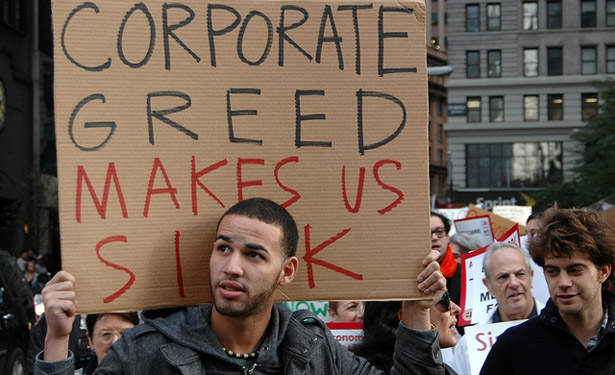The Deadliness of Income Inequality
America's growing wealth gap isn't just an economic problem. It's a public health problem, too.

Growing income inequality in the United States has Americans talking about justice and economic fairness, but a new study suggests the burgeoning wealth gap is threatening more than just our pocketbooks. It might be raising our risk for an early death.
In one of the few studies to track the health effects of income inequality over time, one Ohio State University (OSU) researcher has discovered that an increase in inequality leads mortality rates to begin rising after five years. Inequality-linked mortality peaks about two years later, before tapering off five years after that. All told, even a modest increase in American societal inequality more than doubles an average individual's cumulative risk of death over the next 12 years.
Drawing data from the U.S. National Health Interview Survey for the years 1986 to 2004, the study found that for every 0.01 increase in the Gini coefficient -- a standard measure of a country's economic disparity where 0 represents perfect societal equality and 1 represents maximum inequality -- an average person's cumulative risk of death increased by 112 percent in the next dozen years. Hui Zheng, the OSU sociologist who ran the study, replicated the results using three different measures of inequality across a sample of more than 700,000 Americans aged 30 and older. He then ran the same test on 18- to 25-year-olds, with similar results.
Though Zheng doesn't offer a causal explanation for his results, other studies have suggested that income inequality damages social cohesion, an important factor in maintaining public health. Another possibility may be precisely the argument Occupy Wall Street protesters have taken up for themselves: that the accrual of wealth to the nation's elites creates further incentives to preserve that wealth at the expense of the disadvantaged. Inexplicably, the effect of income inequality on death rates drops off after a dozen years. But, Zheng said, the point is that income inequality doesn't simply have an immediate impact on public health, as previous studies have suggested.
"We need to look at the general trend of the effect," Zheng said in a phone interview. "The findings may be different if we use a different health outcome. For example, in this paper I use individual mortality risk, but if we use disease-specific mortality rates like those for heart disease and cancer mortality, the findings might be a little different. But I argue it's kind of a general trend -- income inequality may not have an instantaneous effect on mortality, but that it may increase over time."
Zheng is already working on a new study that breaks down his previous research demographically. Among his tentative discoveries? Income inequality may actually harm men slightly more than women.
Since 1980, the Gini coefficient in the United States has grown from 0.403 to 0.469 in 2010. Even if inequality were held constant for the foreseeable future, Zheng's research suggests that Americans will be likely to feel the knock-on mortality effects of past inequality increases through at least 2021. Add that to the growing list of things that are killing us slowly.